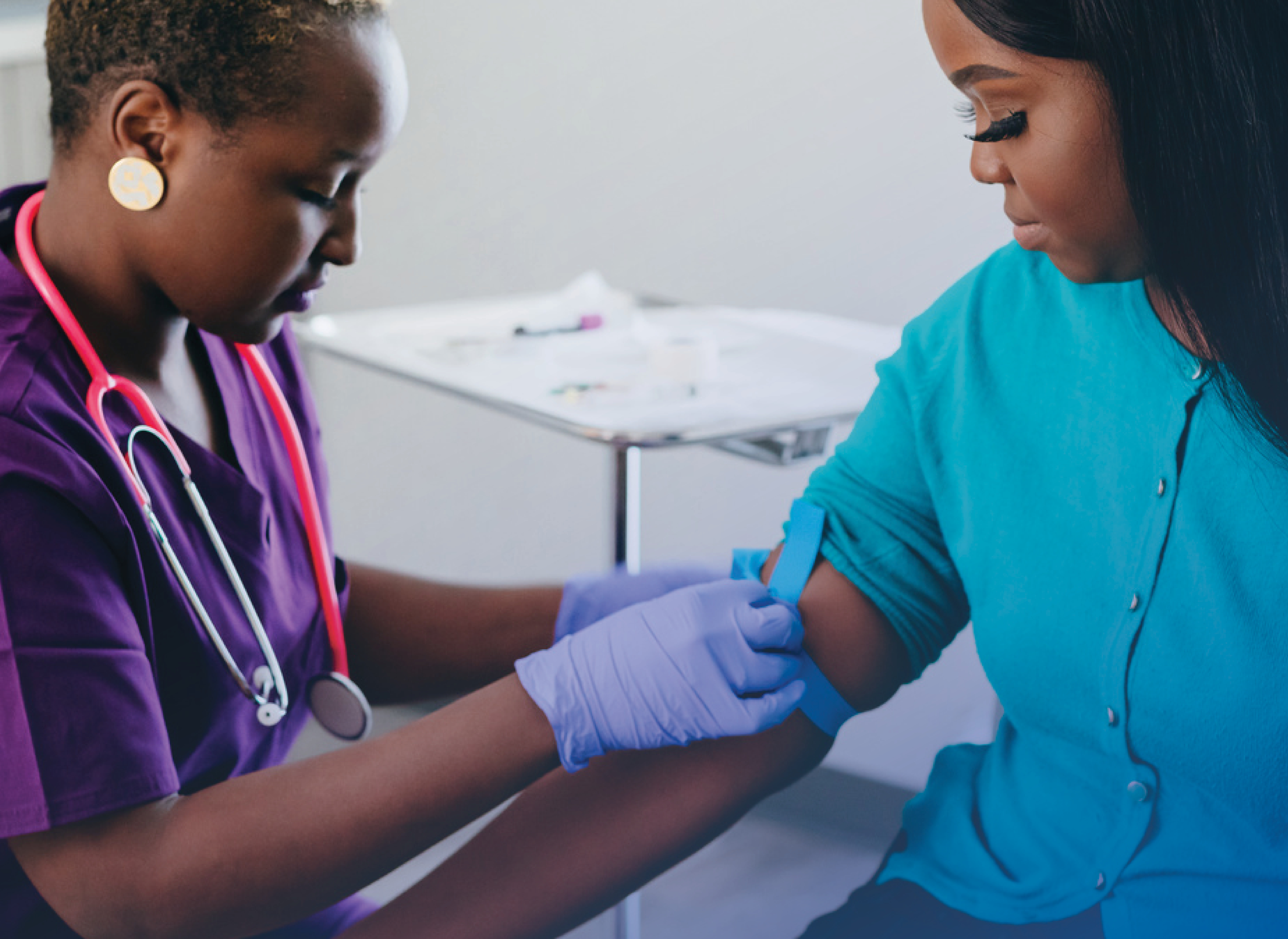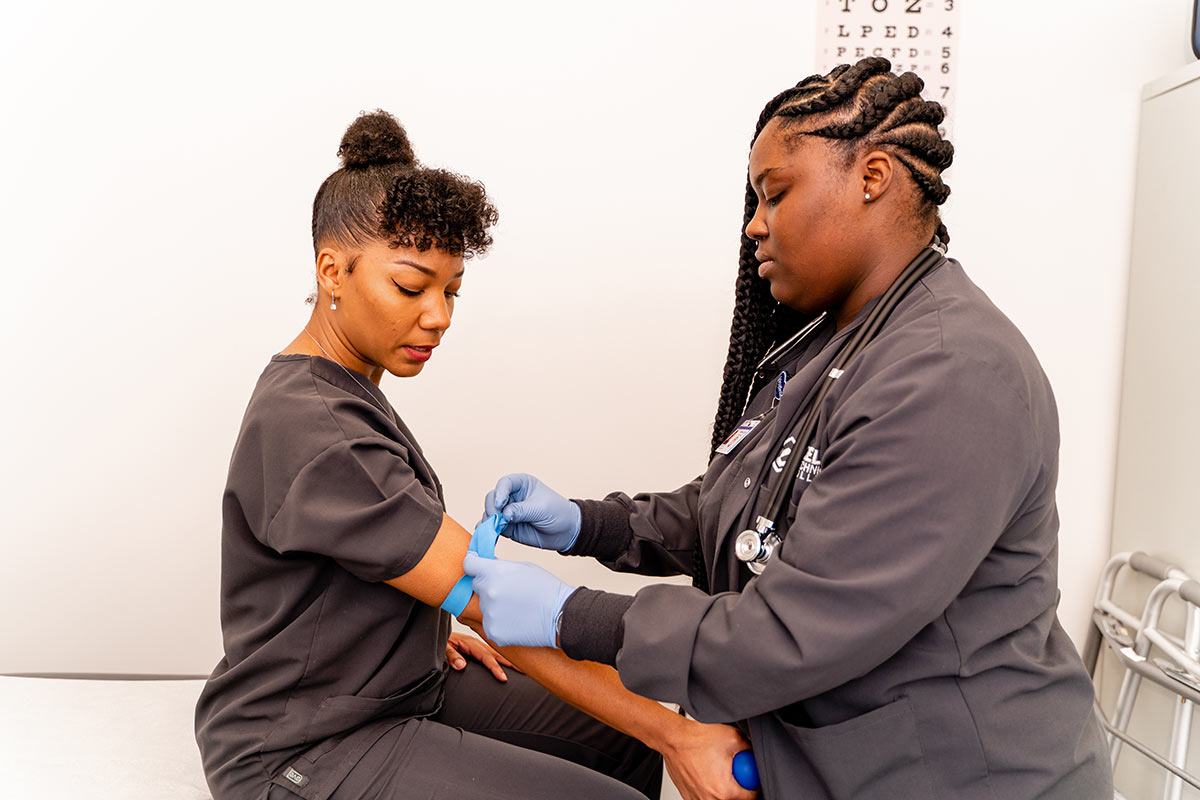Essential Abilities You’ll Learn in a Phlebotomy school
Essential Abilities You’ll Learn in a Phlebotomy school
Blog Article
The Course to Certification: Understanding the Phlebotomy Training Program Trip and Its Value
As you take into consideration the course to qualification in phlebotomy, it's important to understand the role you'll play in medical care. Your training will certainly cover crucial abilities, from blood collection strategies to patient communication. Each part of the program prepares you for the obstacles in advance. What exactly does the trip involve, and why is accreditation so important for your future profession? Allow's discover these questions even more.

The Function of Phlebotomists in Medical Care
Phlebotomists play a crucial function in the medical care system, functioning as the important web link in between people and necessary diagnostic testing. You'll carry out blood attracts, guaranteeing examples are accumulated precisely and safely. Your expertise assists in diagnosing medical conditions, keeping track of wellness, and directing therapy choices.
In your daily communications, you'll require to establish count on with patients, making them feel comfy throughout what may be a difficult experience. You are accountable for labeling and taking care of samples thoroughly to stop contamination or mistakes, which can affect test outcomes.
Past this, you'll often work together with medical professionals and nurses, connecting crucial info concerning people' conditions. Your role is fundamental in preserving the process in health care setups, ensuring timely and accurate results. By grasping your skills, you contribute meaningfully to individual treatment, making you a vital component of the clinical group. Welcoming this duty is key to your success as a phlebotomist.
Summary of Phlebotomy Training Programs
When checking out phlebotomy training programs, you'll find various kinds made to fit various routines and learning styles. Each program aids you create necessary skills like blood collection and client interaction. Recognizing these choices is crucial to selecting the best path for your job.
Kinds of Training Programs
Several kinds of training programs are readily available for those looking to end up being proficient in phlebotomy. Furthermore, some hospitals and clinics supply on-the-job training programs, providing useful experience while you find out. Whatever course you choose, each program aims to furnish you with the essential skills for a successful phlebotomy career.

Trick Skills Developed
Mastering phlebotomy calls for a collection of key abilities that are developed with comprehensive training programs. In addition, communication abilities are basic; you'll require to connect with clients, discuss procedures, and put them at convenience. Each of these abilities is vital for your success as a licensed phlebotomist, making you a useful possession in any kind of medical care setup.
Key Parts of a Phlebotomy Training Course
In a phlebotomy course, you'll concentrate on necessary topics that prepared for your future profession. You'll participate in hands-on training that permits you to use what you have actually discovered in real-world setups. Both the core curriculum and practical experience are essential for your success as a phlebotomist.
Core Curriculum Overview
While pursuing a phlebotomy training program, you'll come across a curriculum created to equip you with basic abilities and expertise. Phlebotomy Training Course. This educational program typically includes composition and physiology, concentrating on the circulatory system and recognizing blood parts. You'll additionally learn more about different sorts of blood collection methods, including venipuncture and capillary slit methods
Furthermore, infection control and safety and security procedures are necessary elements, ensuring you understand exactly how to preserve a sterile environment. You'll examine patient interaction, emphasizing interaction and compassion, which are essential for alleviating patient anxiousness. Ethical and lawful considerations will certainly be attended to, preparing you for real-world duties. This foundational expertise will enable you to stand out as a phlebotomist and provide top quality treatment in professional settings.
Hands-On Training Experience
Getting hands-on experience is an essential component of your phlebotomy training course. This sensible training allows you to use what you have actually learned in a real-world setup, enhancing your abilities and confidence. Phlebotomy school.
In addition, you'll obtain the possibility to interact with individuals, which is crucial for creating your communication abilities. This mix of technological effectiveness and social abilities is essential for your success as a licensed phlebotomist. Eventually, hands-on training is where theory satisfies practice, strengthening your knowledge and readiness for qualification.
Qualification and Licensing Requirements
Prior to you can begin your career in phlebotomy, it is vital to understand the accreditation and licensing demands that vary by state. great site A lot of states require phlebotomists to hold a certification from a recognized organization, such as the National Phlebotomy Organization or the American Culture for Professional Pathology. These accreditations commonly involve passing a test that tests your understanding and skills in the area.
Along with accreditation, some states have particular licensing needs. You may need to finish a certain number of hours in professional technique, submit proof of training, or go through a history check. It is crucial to research your state's laws to see to it you meet all essential criteria.
Staying notified about these needs not just assists you protect a placement however additionally boosts your credibility as an expert. By satisfying these requirements, you'll be well on your way to a successful job in phlebotomy.
Hands-On Training and Practical Experience
Hands-on training and sensible experience are crucial components of your phlebotomy education and learning, as they enable you to use academic knowledge in real-world scenarios. Throughout your training, you'll participate in monitored venipuncture, find out appropriate techniques, and come to be aware of numerous blood collection tools. This straight participation is critical for developing your confidence and refining your abilities.
You'll work closely with seasoned experts that can guide you via the nuances of client communication and example handling. Each practice session not just enhances your understanding yet additionally prepares you for the fast-paced environment of medical care setups.
Additionally, several programs include clinical turnings, allowing you to experience diverse settings, from hospitals to outpatient facilities. This direct exposure aids you adjust to different obstacles and investigate this site person needs, ensuring you're well-prepared for your future duty. Welcome these chances, as they're necessary to ending up being a qualified and compassionate phlebotomist.
Obstacles Faced During Training
While obtaining hands-on experience is necessary, it's vital to acknowledge the obstacles that can arise throughout your phlebotomy training. Additionally, grasping the abilities needed for blood attracts takes method; you might have a hard time with technique at first.
Time administration can additionally be a hurdle, as balancing concept, functional sessions, and individual dedications can really feel challenging. You might encounter differing finding out speeds amongst your peers, bring about sensations of insecurity if you assume you're falling back. Adjusting to the various individualities of teachers can be challenging, as each may have an one-of-a-kind teaching style.
Acknowledging these barriers at an early stage can prepare you for success and aid you establish strength throughout your training trip.
Occupation Opportunities After Qualification

As you acquire experience, you could even consider focusing on areas like pediatric or senior citizen phlebotomy, accommodating particular client needs. Some phlebotomists choose site web to advance their occupations by coming to be research laboratory technicians or pursuing additional education in healthcare areas.
Additionally, your certification can result in duties in training or monitoring brand-new phlebotomists, permitting you to share your understanding. With the health care sector consistently expanding, your skills will constantly be in demand, leading the way for a stable and meeting career. Accept the chances waiting on you!
Frequently Asked Questions
What Is the Normal Duration of a Phlebotomy Educating Course?
Phlebotomy training programs commonly last around four to eight weeks. You'll take part in hands-on practice, classroom direction, and online knowing. Completing this training prepares you for accreditation and a gratifying career in healthcare.
Are Online Phlebotomy Courses Available?
Yes, online phlebotomy programs are available. They supply flexibility and ease, enabling you to research at your own speed. Simply verify the program is accredited to meet certification demands and get useful abilities for your occupation.
Just How Much Does Phlebotomy Training Typically Cost?
Phlebotomy training typically costs in between $700 and $2,500, relying on the program and place. You must think about factors like course size, consisted of products, and hands-on experience when picking the appropriate training for you.
What Prevail Prerequisites for Phlebotomy Training?
Common requirements for phlebotomy training often consist of a secondary school diploma or GED, booster shots, and a background check. Some programs might likewise require standard medical care expertise or accreditations, ensuring you're prepared for hands-on training.
Can I Work While Finishing My Phlebotomy Training?
Yes, you can work while completing your phlebotomy training. Several pupils equilibrium work with their researches, however make sure to handle your time properly to ensure you fulfill both job and training dedications successfully.
Report this page